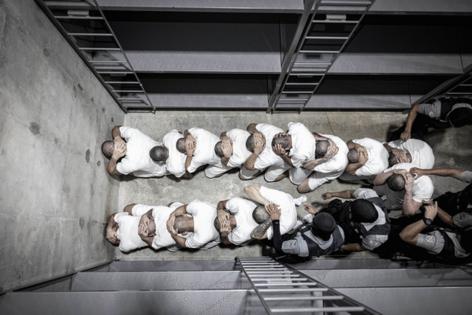US intelligence report challenges Trump claim that Maduro controls Tren de Aragua
Published in News & Features
A newly released report from the U.S. National Intelligence Council concludes that while the Nicolás Maduro regime tolerates the feared Venezuelan gang Tren de Aragua, it is unlikely the Venezuelan strongman exercises direct control over the organization.
That finding contradicts a central assertion made by former President Donald Trump in his recent invocation of wartime powers to expedite the deportation of suspected gang members to a maximum security prison in El Salvador.
First reported by The New York Times, the intelligence memorandum portrays a Venezuela where criminal networks like TdA thrive amid widespread state dysfunction and selective law enforcement. However, it emphasizes that no conclusive evidence supports the claim that the socialist regime in Caracas commands the criminal group.
“While Venezuela’s permissive environment enables TDA to operate, the Maduro regime probably does not have a policy of cooperating with TDA and is not directing TDA movements to or operations in the United States,” the April 7 memorandum, titled Venezuela: Examining Regime Ties to Tren de Aragua, says.
“This judgment is based on Venezuelan law enforcement actions indicating the regime treats TDA as a threat; an uneasy mix of cooperation and confrontation — rather than top-down control — characterizing the regime’s ties to armed groups; and the decentralized structure of TDA that would make a direct command relationship logistically difficult,” the memo added.
The National Intelligence Council falls under the office of the U.S. Director of National Intelligence.
Opposition figures in Venezuela, including prominent leader María Corina Machado, have long alleged that Maduro and top regime official Diosdado Cabello are the true masterminds behind the gang. The claims took on new significance in March when Trump cited them as justification for invoking the Alien Enemies Act of 1798 — a rarely used wartime statute — to fast-track the deportation of Venezuelans suspected of gang affiliation, bypassing normal legal procedures.
The Trump administration initially used the act to transfer Venezuelan detainees to a maximum-security prison in El Salvador. However, U.S. courts have since blocked the policy.
In his March proclamation, Trump claimed that Maduro deliberately sent TDA members to the United States as part of an “organized aggression” aimed at destabilizing the country. He asserted that many gang members had infiltrated the U.S. under orders from Maduro and Cabello, describing their presence as an act of “irregular warfare.” The administration had previously designated Tren de Aragua as a Foreign Terrorist Organization while the Department of Justice has several indictments accusing Maduro, Cabello and othe top regime members of leading Venezuela’s top narco-trafficking group, the Soles Cartel.
“The regime is perpetrating an invasion and predatory incursion into the United States, which poses a substantial danger,” Trump said in his March proclamation. “TdA operates in conjunction with the Cartel de los Soles, the Nicolás Maduro regime-sponsored narco-terrorist enterprise based in Venezuela, and commits brutal crimes including murder, kidnapping, extortion, and trafficking of humans, drugs, and weapons.”
Tren de Aragua originated in the notorious Tocorón prison in Venezuela’s Aragua state around 2007 and has since evolved into a decentralized criminal network with a presence in at least seven countries, including Colombia, Peru, Chile and the United States. Its growth has been fueled by Venezuela’s ongoing political and institutional collapse, allowing the gang to exploit weak governance and law enforcement, the intelligence report said.
While the report dismisses claims of centralized control, it acknowledges that the Maduro regime maintains sporadic and opportunistic ties with TdA. Certain regime members are believed to tolerate or even collaborate with the gang for financial or strategic reasons. The group’s founding leaders — Héctor Guerrero Flores, Yohan José Romero and Larry Álvarez Núñez (currently in Colombian custody) — escaped from prison in 2023, reportedly aided by corrupt officials.
The report also notes that while Venezuelan security forces have at times cracked down on the gang—such as through recent National Guard arrests and armed confrontations — authorities lack both the capacity and, in some cases, the will to dismantle the organization. Lower-level officials may be profiting from TdA’s criminal enterprises, including drug trafficking and migrant smuggling.
The report also said that it found no credible intelligence supporting the claim that the Venezuelan government is orchestrating TDA’s migration to or criminal operations within the United States. However, some U.S. agencies, such as the FBI and Homeland Security, suspect that elements within the Venezuelan state may be facilitating the gang’s expansion abroad to destabilize countries like Colombia, Chile and the U.S. — a view not broadly shared across the intelligence community.
The report also emphasizes that the gang’s international spread is closely linked to the Venezuelan migrant crisis — nearly 8 million citizens have fled since 2014. Intelligence suggests some TdA members have traveled alongside migrant caravans, but there is limited evidence of their involvement in large-scale human trafficking.
While allegations of cooperation between top regime officials and TdA persist — naming figures like Cabello and former prisons minister Iris Varela — most of the claims are unverified or stem from individuals facing prosecution.
The National Intelligence Council continues to monitor potential shifts in regime-gang relations, including changes in enforcement, indications of state support and weapons transfers. A high-profile case involving Chile’s referral of a 2024 assassination of a Venezuelan dissident to the International Criminal Court could shed further light on the Venezuelan regime’s ties to the gang.
©2025 Miami Herald. Visit at miamiherald.com. Distributed by Tribune Content Agency, LLC.







Comments